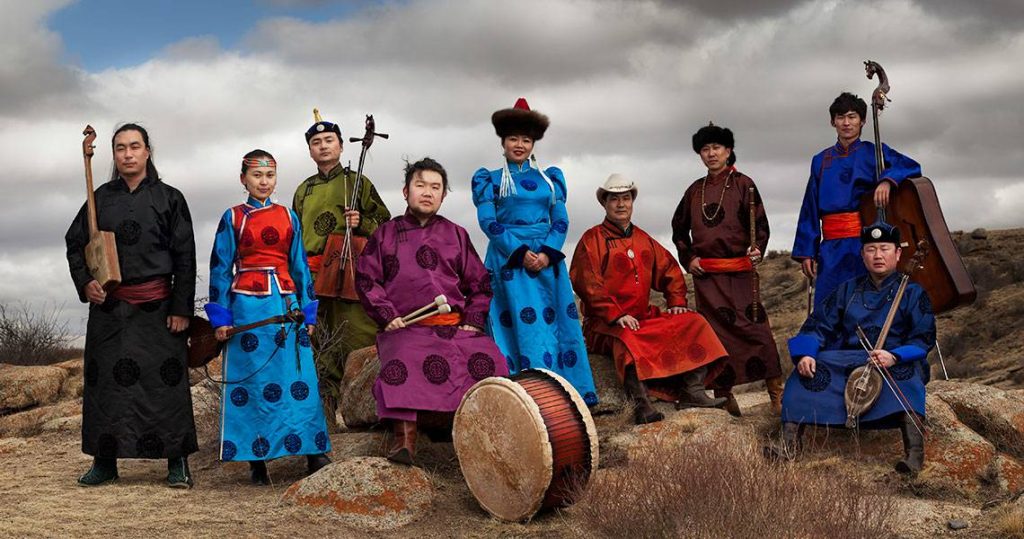
Anda Union brought images of Mongolia’s windswept grasslands to BYU for a unique performance of ethnic music. The concert on Thursday, Oct. 27, was part of BYU’s BRAVO! series.
The group hails from Inner Mongolia, part of the People’s Republic of China, and specializes in ancient and traditional Mongolian music. Most of the group members grew up listening to the songs they perform today. Now they share those songs to promote and protect traditional Mongolian lifestyle.
The instruments used in the performance were all used anciently by grassland shepherds and horsemen. Square-shaped horse-head fiddles in various sizes resemble cellos and upright basses, all with only two strings and a distinctive horse’s head carved into the top of the neck above the tuning pegs. The group also played sheepskin drums, Mongolian lutes, chimes, a reed flute and even seashells shaken on a string.
The music incorporated heavy beats, wailing vocals and the gritty drone of “Hoomei,” or Mongolian throat singing. Throat singing occurs when the singer manipulates resonance in the throat and produces two pitches simultaneously. Eric Hyer, BYU’s Asian Studies coordinator, said throat singing is unique to Mongolia.
“It’s this harmonic voice, so it has in some cases this kind of eerie quality,” Hyer said. “I don’t know that it exists anywhere else.”
At one point in the concert, the flute player Chinggel sat alone on stage. The crowd gasped as he began to throat sing and play the flute simultaneously, taking them through a song called “The Holy Mountain.”
All the songs were based on old Mongolian legends or tributes to the grasslands. Players introduced each song in broken English and explained what it meant to them. Often they learned the songs from their grandparents or dedicated them to their mothers. Tsetsegmaa, the lead female vocalist, wept as she sang a mournful song about her homeland. At another point, players imitated the whinnies of horses on their fiddles as they commenced a song about battle.
Clips from a documentary about Anda Union were the background of some songs, depicting sweeping Mongolian grasslands and nomadic shepherds living in colorful tents. BRAVO! series producer Jeffrey Martin said they were, in essence, inviting the audience into their world.
The crowd gave the group a standing ovation at the end of the concert.
The players shuffled back onstage for an encore piece, and Nars, the self-elected spokesman of the group, grinned widely.
“Everyone want more horse song?” Nars said. “We will have more horse song!”
The BYU Kennedy Center frequently coordinates with the BRAVO! series to bring Asian groups to campus. Hyer said that Anda Union’s visit was made possible by a federal grant awarded to the Kennedy Center for Asian Studies. A portion of the grant is reserved for performances meant to expand student cultural vision.
Martin said Anda Union’s visit fits in well with the purpose of the BRAVO! series, which is to inspire students to become better.
“Hopefully it will inspire (students) to think of music in broad terms,” Martin said. “They don’t have to pick up the horse-head fiddle, but I think these kind of things can help expand our understanding of what music is and culture is, and just enrich us.”
The Anda Union arrived at BYU on Monday, Oct. 24, and participated in master classes and community outreach activities for several days. They presented to several world music classes and an auditorium of interested high school students. They will perform at BYU-Idaho later this week, inviting students there into the world of traditional Mongolian music and legend.
“Welcome to Inner Mongolia,” Nars said. “Have lots of horses. Welcome.”




